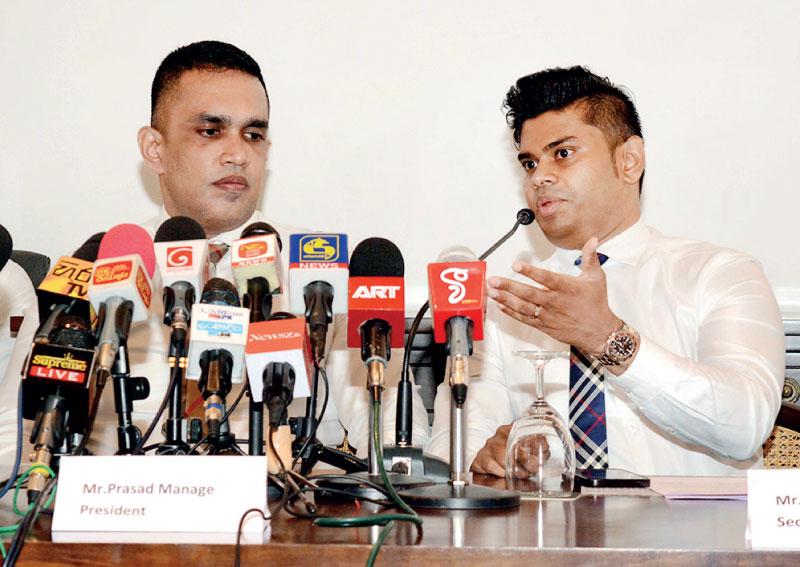Reply To:
Name - Reply Comment

From left: Vehicle Importers Association of Sri Lanka President Prasad Manage and Secretary Arosha Rodrigo PIC BY PRADEEP PATHIRANA
By Nishel Fernando
Sri Lanka’s vehicle importers this week cried foul of the government’s move to permit electric and hybrid electric vehicle imports with zero tariff to one company, under the guise of electric and hybrid vehicle assembling in the country, which they claimed could deprive the state coffers billions of rupees while causing a massive foreign exchange outflow during the next two-year period.
According to the Vehicle Importers Association of Sri Lanka (VIASL), President Ranil Wickremesinghe, in his capacity as the Minister of Investment Promotion, recently submitted a Cabinet memorandum titled ‘Vehicle Assembly Plant Project at Kuliyaptiya by Western Automobile Assembly (Pvt.) Ltd.’
The memorandum sought the approval of the Cabinet of Ministers to permit a company, which was formerly known as Senok Automobiles Assembly (Pvt.) Limited, to import brand-new SKD kits for assembling electric vehicles up to 500kW, electric two-wheelers and plug-in hybrid electric vehicles up to 3000cc engine capacity, on a tariff-free basis against the existing 30 percent tariff.
“The big question arises as to what the government would gain in the event of the requested zero percent tariff being granted. We had on prior occasions highlighted the massive leakages of vital foreign currency, with minimum government revenue in the form of custom duty, even under the existing tariff of 30 percent, where companies claiming to assemble vehicles have rather made use of this loophole to bring down complete vehicles in several fragments and putting them together in basic plants, which lack any sophistication.
This has resulted in minimum value addition and on the other hand, it has deprived the government billions of rupees in customs revenue, in comparison to the actual applicable custom duty to import such a motor vehicle,” VIASL Secretary Arosha Rodrigo told reporters in Colombo, on Wednesday.
VIASL President Prasad Manage warned that the loss to the state coffers could well exceed the purported loss incurred, due to the alleged ‘bond scam’.
Meanwhile, Rodrigo pointed out that the proposal allows preferential percentages in local value addition, including zero value addition during the first two years, with no apparent benefit to the local economy while exhausting the country’s limited foreign exchange reserves.
“We believe that a zero percent value addition during the first two years and 5 percent during the third year, at the expense of a massive amount of foreign exchange, are unjustifiable to an economy recovering from a major financial crisis, which resulted primarily due to a foreign exchange crisis,” he added. In particular, the VIASL highlighted that in the absence of an upper ceiling, the eligible company could import brand-new SKD units, well beyond the required minimum investment value of US $ 50 million.
“A zero percent tariff will definitely contribute to the imports of excess stocks, hence leading to a foreign currency exchange outflow of multiple levels of the initial investment,” Rodrigo said. While questioning the government’s double standards to allow one company to import vehicles, under the disguise of local vehicle assembling, Manage recalled an earlier occasion where the Treasury officials refused to allow motor vehicle imports until the country’s official foreign exchange is built up to around US $ 7 billion.
Further, Rodrigo cautioned that the proposed scheme could adversely impact the ongoing International Monetary Fund (IMF) programme, given the impact on state revenue and foreign exchange reverses.
Meanwhile, the VIASL raised questions about Western Automobile’s eligibility for this proposed scheme, specifically in relation to whether it meets the minimum investment threshold of US $ 50 million. The VIASL pointed out that as per the confirmation report of auditors of Western Automobile, the total investment made by the company as of December 31, 2021, stood at Rs.8.05 billion, including the equity capital of Rs.1.55 billion and Rs.6.50 billion bank loans. It also included the value of the land, which was acquired on lease from the government.
Further, the VIASL highlighted that the calculation is based on the “unrealistic” and “obsolete” currency exchange rate of Rs.161 per US dollar, which is less than half of today’s exchange rate. “Although very unclear, the proposal is trying to portray the aforementioned as the equivalent of the required investment of US $ 50 million,” Rodrigo remarked.
He also questioned the track record of the company as a Board of Investment entity, which was granted an eight-year tax holiday in 2015, to locally assemble diesel vehicles, with Germany’s Volkswagen as the technical collaborator.
While the eligibility criteria and concessions proposed in this scheme reportedly received the Cabinet approval, the Cabinet of Ministers is expected to consider the entire scheme for the approval next week.
The VIASL urged Wickremesinghe and the Cabinet of Ministers to not to go ahead with the proposed scheme, given the grave repercussions. “If this gets approved by the Cabinet, this will have a severe impact on our already deteriorating economy, affecting our foreign currency reserve as well as the national income. There will be no US dollar inflow from this venture and the government will not benefit in any form,” Rodrigo said.